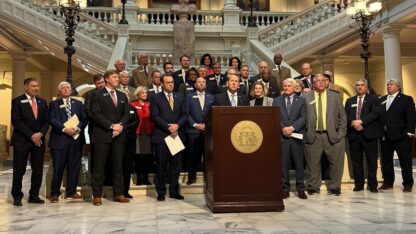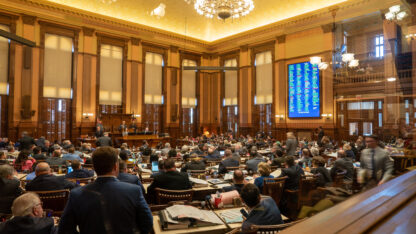Georgia lawmakers have given final approval to two pieces of Republican Gov. Brian Kemp’s tax cut agenda.
The measures would give income tax filers another $1 billion in tax refunds and to ratify Kemp’s decision to waive tax collections on gasoline and diesel fuel for months.
Kemp already signed his plan for a $950 million property tax rebate into law Friday as part of the amended budget for this year.
Both the income tax and property tax givebacks were key Kemp pledges in his successful reelection campaign last year.
The Senate voted 46-7 for House Bill 162 would give a second year in a row of income tax refunds.
Kemp is expected to sign it, the bill, which would give a refund of up to $250 to single filers, up to $375 to single adults who head a household with dependents and up to $500 to married couples filing jointly.
The refund would only be paid to people who filed tax returns for both the 2021 and 2022 tax years, and no one can get back more than they paid in state income taxes in 2021. Rebates or credits would be issued later this year. They would be automatic for anyone who files a 2021 and 2022 return, with no further action required.
People who don’t owe state income taxes, including many retirees, wouldn’t get any money. However, people claimed as dependents who worked last year, typically students, can get refunds if they file taxes separately.
“This bill is about getting state money back in the pockets of hardworking Georgians instead of letting it stay here at the state level,” said Mike Hodges, a Brunswick Republican who carries bills for Kemp as one of the Republican’s floor leaders.
Some Democrats said state money could have been better spent on granting larger rebates to people who earn wages too low to pay much in taxes.
“Those who don’t owe state income tax because they earn too little, despite working full time, will not see any money from this bill,” said Sen. Elena Parent, an Atlanta Democrat who voted against the bill.
They also argued that the state could better spend the money on underfunded state services including higher salaries for teachers, childcare subsidies for poor families and funding for expanded healthcare access.
“We have created a culture of not using our budget to sustain government in the most basic ways to ensure good government and ensure responsive services for all our citizens,” said Josh McLaurin, an Atlanta Democrat who said he was voting for the bill anyway because lawmakers had created an expectation of tax rebates.
Kemp can seek another year of rebates because state coffers continue to overflow. Georgia ended its last budget year with $6.6 billion in surplus revenue in the bank. That’s in addition to the state’s rainy day fund, now filled to its legal limit of $5.2 billion.
The Senate voted 53-0 Tuesday to approve House Resolution 66, which ratifies Kemp’s decision to keep extending what had originally been legislated as a six-week holiday on gasoline and diesel taxes last spring. Through a series of executive orders, Kemp pushed that extension past his reelection date into early January. Such a move is legal as long as lawmakers approve it the next time they meet. Kemp does not have to sign the resolution.
The fuel tax suspension cost the state an estimated $1.7 billion in foregone revenue over parts of two budget years. The state already dipped into its surplus to make up $600 million in lost revenue for the 2022 budget year. Officials estimate they will use $1.1 billion in other tax revenues from the current budget year to keep roadbuilding funds flowing.










